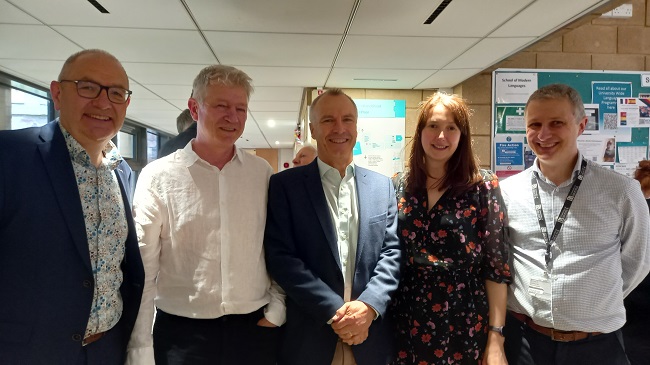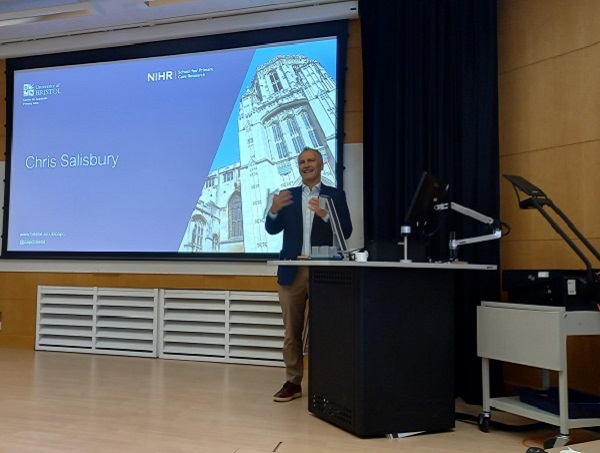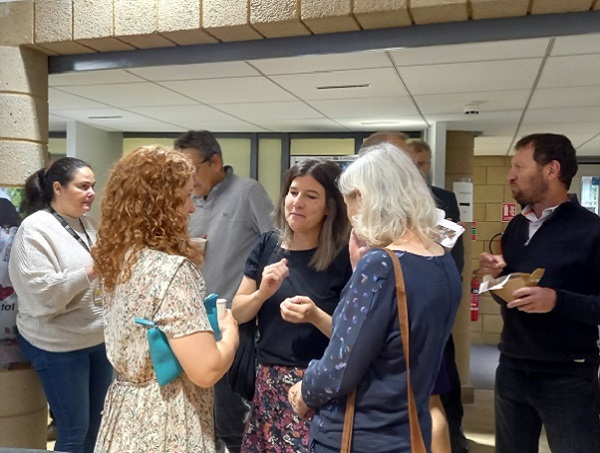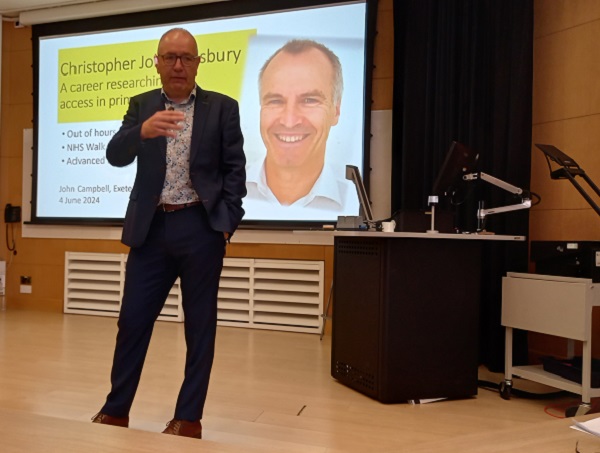Attending the Festchrift – an event honouring the work of a respected academic during their lifetime – were colleagues past and present, with four talks delivered by senior peers: Professor Matthew Ridd (Bristol), Professor John Campbell (Exeter), Professor Helen Atherton (Southampton) and Professor Bruce Guthrie (Edinburgh).
Each talked about the groundbreaking research that they had worked on with Chris: patient-clinician relationships and consultations; access to primary health care; digital health care; and multimorbidity respectively.

L-R: Professor John Campbell, Professor Bruce Guthrie, Professor Chris Salisbury, Professor Helen Atherton, Professor Matthew Ridd
Chris has had an incredible GP and academic primary care career spanning over 40 years, much of that time spent here at the University of Bristol. He has published five books and over 250 research papers on how to improve provision of primary care, including several high-profile evaluations of new models of care, such as changes in out-of-hours arrangements, NHS walk-in centres, GPs with Special Interests, telehealth for chronic disease management, and the potential of new forms of consultation such as e-consultations.
In recent years he has focused on how health care should address the challenge of the growing number of people with multiple long term conditions (‘multimorbidity’). He conducted the first study of the epidemiology of multimorbidity in the UK, along with contributing to systematic reviews on the prevalence, outcomes and measurement of multimorbidity. Professor Salisbury has championed the case for providing more patient-centred care for patients with multiple long term conditions. He has developed and evaluated interventions to improve chronic disease management, including the largest ever trial of an intervention for patients with multimorbidity – the 3D trial. The findings from this trial were published in the Lancet in 2018.
Chris has sat on over 50 commissioning and advisory groups. He recently co-chaired the Medical Research Council call for research on multimorbidity, was a member of the Royal College of General Practitioners patient-centred care commission, and a member of the Taskforce on Multiple Conditions established by the Richmond Group of Charities.
Among his many roles, Chris, has been a board member for the NIHR Health Services & Delivery Research programme and the NIHR School for Primary Care Research, chair of the RCGP Scientific Foundation Board and RCGP Research Paper of the Year Panel, and a member of several other national and international boards and advisory bodies. In December 2018 he gave the prestigious James Mackenzie lecture at the RCGP AGM, entitled ‘Designing health care for the people who need it’. In 2023 he was awarded the RCGP George Abercrombie prize for outstanding contribution to the literature on general practice.
From 2010 to 2017, Chris was the Head of CAPC, and oversaw the successful renewal of CAPC’s membership of the NIHR School for Primary Care Research.
Professor Richard Martin, Deputy Head of Bristol Medical School, who chaired the Festchrift, said: “Chris’s scholarly work directly influenced NHS policy on new models of primary care and complex interventions, including out-of-hours care, NHS walk-in centres, digital technology, chronic disease management and multimorbidity. These projects were complex, high profile and often conducted under pressure in politically sensitive areas. Chris brilliantly walked that challenging tightrope between ensuring the very highest academic standards while firmly rooting his research towards tackling questions of major relevance to the profession of primary care, often being years ahead of the policy curve. He excelled in all aspects of academic life – research, teaching and leadership – and as a hugely respected, liked and admired colleague.”
Professor Katrina Turner, Head of CAPC, said: “It was fantastic to celebrate and reflect on the incredible career of an outstanding colleague. Chris will be hugely missed within the community of academic primary care, not only for his impactful research and brilliant leadership but also for his kindness and collegiality. He is hugely admired and respected for the work he has done and for the person he is.”
To close the Festchrift, Professor Salisbury shared his own reflections on his academic life, with characteristically generous and sage advice to those starting out in their careers, which included:
On research:
- Do the things that matter
- Focus on big questions
- Quality not quantity
- Papers are the beginning, not the end (engage with the real world, with influencers, commissioners, policy makers)
- Keep your head up (say yes, build networks)
- Define yourself (be able to summarise what you do elevator-pitch style)
- Be curious, be brave
- Talk to people about your ideas (the gain is greater than the risk).
On teaching:
- It’s fun and important
- Approach it with as much enthusiasm as research
- Be inspiring, be a role model
- You can have a lifelong impact.
On leadership:
- Begin with the end in mind (and keep it in mind)
- Remember your core purpose
- Look after the team, the golden goose which produces the golden eggs (treat people well, fairly and with kindness)
- Remove obstacles in their way.
We are hugely grateful to Chris for his immense contribution to primary care and improving the lives of patients, for his inspiring leadership and teaching at CAPC, and the support he has given to so many patients, students and colleagues throughout his career. We wish him all the very best in his retirement.




